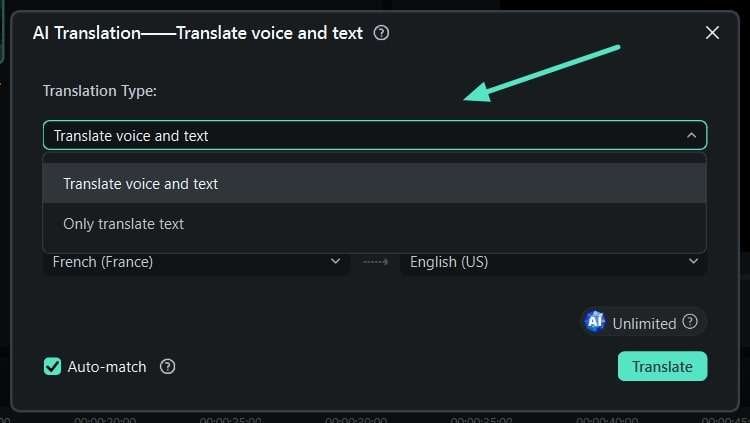Video translation helps overcome language barriers, ensuring everyone can access important information and entertainment. Since Tamil is the 17th most spoken language in the world, translating English videos into Tamil is essential for reaching Tamil-speaking audiences.
For example, businesses launching products in Tamil Nadu can better connect with customers by translating their promotional videos. Schools can also support Tamil-speaking students by translating educational English YouTube videos into Tamil.
Fortunately, there are various tools and methods available to make this process easier, such as translation software, subtitling services, and dubbing options. This guide will walk you through the steps to translate videos from English to Tamil, using advanced tools to create clear and engaging content for Tamil-speaking viewers.
In this article
Part 1. What Are the Most Common Challenges When Translating English Videos to Tamil
Translating English videos into Tamil presents a range of challenges because of the substantial linguistic and cultural differences between the two languages. These challenges arise from the fundamental differences between the two languages and the unique cultural contexts in which they are used.
Here are some of the most common obstacles faced during translating English videos to Tamil:
Idiomatic Expressions
English idioms and colloquial phrases often lack direct Tamil equivalents, making it challenging to convey the same meaning or humor without altering the intended message. Translators must find culturally appropriate phrases or rephrase the content to ensure the meaning is preserved and relatable for Tamil-speaking viewers.
Language Structure Differences
English and Tamil have different grammatical structures and word orders. English typically follows a Subject-Verb-Object (SVO) format, while Tamil uses a Subject-Object-Verb (SOV) structure, requiring careful rephrasing to maintain clarity.
Tone and Formality
Preserving the original tone and level of formality in the translation is important for maintaining the content's impact. Adjusting the tone to fit Tamil-speaking audiences while retaining the speaker's intended style can be challenging.
Technical Terminology
Specialized vocabulary in fields like technology, medicine, or finance may not have direct Tamil counterparts, necessitating the creation of descriptive phrases or the adoption of loanwords to ensure accuracy.
Voice-Over and Dubbing Challenges
Matching Tamil voiceovers with the original actors’ lip movements and ensuring that the dubbed audio feels natural and synchronized with the video can be complex and require creative adjustments.
Part 2. Filmora: An AI Tool That Helps You Convert English Videos into Tamil
Lucky for you, Wondershare Filmora can help you tackle all of the common challenges mentioned above. This versatile video editing software is well-known for its easy-to-use interface and powerful features, making it a great choice for both beginners and professional editors.
Among its AI-driven functionalities, Filmora includes AI translation. This feature makes it easy to translate videos between languages. First, it turns the spoken English into text. Then, it translates that text into Tamil. The translated text is then converted into speech and synced with the video’s original audio. Additionally, you can also add translated subtitles or voiceovers and adjust them as needed.
Key Features of Filmora AI Video Translation
Now that you know why Filmora is the best English-to-Tamil video translator, let’s dive deep into its features that make translation smooth and easy such as voice cloning, lip-sync, and powerful AI-driven translation tools:
- Voice Cloning: Filmora video translator utilizes advanced and cutting-edge cloning technology that's essential in replicating your unique voice into another language and keeping the natural appeal and timbre of your voice.
- Lip Sync: This feature allows you to accurately translate the voice and text of a video. You can choose to automatically translate English video to Tamil, and the software will sync the voice and subtitles to match the original content’s timing.
- Subtitle Editor: After your video is translated, Filmora allows you to easily fine-tune the subtitles, edit the style of the text, or even add additional audio tracks.
- Multi-language Support: Another key feature of Filmora is its support for over 20 languages, including Arabic, Spanish, and Hindi, with an accuracy rate of over 95%. Therefore, whether you're translating from English to Tamil or any other language, this tool can handle it.
- Audio translation: Do you want to translate audio files? Filmora’s AI translation feature accurately translates text and ensures smooth playback.
In a nutshell, the main advantage of using a tool like Filmora is that it’s much faster and more accurate than manual translation—efficiently taking care of the translation so that you can focus on more important things.
A Simple Step-by-step Guide To Translating English Videos into Tamil
Step1Install Filmora and upload your English video
If you haven't already, install the latest version of Wondershare Filmora. Follow the installation process. Once it's installed, double-click to open the program, create a new project, and import your English video. Then, drag and drop the videos onto the editing timeline.
- Empower your content with multilingual support and lip-sync dubbing.
- Translate your videos with ease and accuracy using AI technology.
- Connect with audiences worldwide through language translation.

Step2Access AI Translation feature
Find the "AI Translation" icon on the timeline toolbar. To do this, right-click on the video in the timeline and select the "AI Translation" option from the drop-down menu.

Step3Choose the type of translation
After selecting AI Translation, a dialogue box will pop up. Go to the "Translation Type" section, open the list, and choose either "Translate voice and text" or "Only translate text" based on your needs. For this situation, select "Only translate text."

It's important to know that Filmora can recognize 23 source languages for combined voice and text translation, but it only translates into 14 target languages. However, for text translation alone, it supports all 23 recognized languages.
Step4Set parameters
In the media’s "Source Language" option, select "English" since the video is in English. For the "Target Language" option, choose "Tamil" to translate the video into Tamil. Then, enable the "Auto-match" option to synchronize the transcription with the timeline. Finally, click the "Translate" button to start the translation process after setting all the parameters.

Step5Wait for the process to finish, then export the final results
A pop-up screen will show the progress of the translation. Wait until it displays "Completed", indicating that the translation is finished. You can then close the dialogue box and play your media to review the results.
Next, go to the top-right corner and click the "Export" button to save the media to your device.

On average, translating a standard-length English video (about 10-20 minutes) to Tamil using Filmora might take 15 minutes to an hour. However, the time needed can vary depending on several factors.
Longer videos generally require more time to translate. Videos with complex dialogue or technical terms may also need additional processing time. Additionally, faster computers can complete the translation process more quickly.
Part 3. What makes Wondershare Filmora video Translator Special
After seeing an example of the step-by-step guide on how to use Wondershare Filmora to translate English videos to Tamil, you might be curious about what additional benefits this software offers. In this section, we will look into the features that make Wondershare Filmora's video translator stand out.
1. High Accuracy
With Filmora's AI Translation, you can expect high accuracy, boasting over 90% precision. The advanced AI technology behind Filmora minimizes errors and preserves the nuances of your original content, allowing you to confidently share your message with audiences around the world. This high level of accuracy supports your content's integrity and helps maintain its impact, no matter the language.
2. Various Languages
In addition to Tamil, Filmora's translation feature supports a diverse array of languages, offering translations into 23 different languages. This includes widely spoken languages such as English (both US and UK variants), Spanish, and Chinese (Taiwan and Hong Kong), as well as less commonly used languages like Polish, Marathi, and Swedish. With this extensive language support, you can reach a global audience and make your content accessible to people from many different linguistic backgrounds.
3. Comprehensive Editing Capabilities
Beyond translation, Filmora provides a wide range of video editing features that can help enhance your translated content. These include advanced options such as Speech-to-Text for generating accurate subtitles, Automatic Captions for effortless captioning, and AI Copilot Editing for smart editing assistance. This comprehensive suite of tools allows for detailed editing and enhancement of videos before or after translation, ensuring a polished final product.
4. Affordability
Compared to other video editing software with similar advanced features, Wondershare Filmora is more budget-friendly. It starts at just $49.99/year for individuals and $155.88/year for teams and businesses. This competitive pricing makes Filmora an accessible choice for both individuals and businesses wanting to translate and edit videos without spending a fortune.
Part 4. Use Cases of AI Translation with Filmora
Given all the benefits outlined, it’s clear that Filmora’s AI Translation is highly versatile and can be effectively used in a variety of scenarios. This flexibility makes Filmora’s AI Translation a valuable tool for diverse translation needs. Here are a few specific scenarios for using AI Translation with Filmora:
- Multilingual Educational Content
Filmora’s AI translation can be used to convert educational videos from English into Tamil, making them accessible to Tamil-speaking students. This is particularly useful for online courses, tutorials, and instructional videos.
- Marketing Videos
By using Filmora’s AI Translation, marketers can translate promotional videos into Tamil to engage with Tamil-speaking consumers. This includes advertisements, product demos, and brand stories, helping businesses connect with diverse markets.
- Entertainment and Media
Filmora can translate English TV shows, movies, or web series into Tamil, making content available to Tamil-speaking viewers. This can be useful for streaming platforms and media companies looking to expand their reach.
- Personal Projects
Lastly, you can use Filmora to translate your personal videos, like travel vlogs or family recordings, into Tamil. This allows them to share their content with Tamil-speaking friends and family, making it accessible to a wider audience and enhancing their ability to connect with loved ones.
Handling Idiomatic Expressions in Video Translations
Filmora’s AI translation may not always perfectly handle idiomatic expressions due to the complexity and cultural nuances of such phrases. While the AI can provide a general translation, it may not capture the exact meaning or sentiment.
For this issue, you might need to make manual adjustments to translations to make sure that idiomatic expressions are correctly understood in Tamil. This helps ensure that the original meaning and context of these phrases are preserved, so they make sense to Tamil-speaking viewers.
Customizing Voice Tone and Style
With advanced features like AI Voice Changer or AI Voice Cloning, Filmora allows users to customize the voice tone and style when translating English videos into Tamil. This feature is particularly useful for maintaining the original tone and style of the video’s content.
For instance, if the original video has a formal tone, you can ensure that the Tamil translation reflects that formality. Similarly, for a casual or enthusiastic style, adjustments can be made to match the original voiceover’s character and mood, providing a more consistent and engaging viewer experience.
Conclusion
Translating English videos into Tamil is important for reaching a broader audience and connecting with Tamil-speaking viewers. However, challenges such as differences in language structure and tone can make translation difficult.
Thankfully, advanced translation tools can help address these issues and improve the quality and accuracy of your translations. They offer features that simplify the translation process, making it easier to engage effectively with your target audience.
Among these options, Wondershare Filmora stands out for its user-friendly interface and powerful AI translation features. It provides a practical solution for translating videos efficiently, ensuring that your content maintains its original tone and message.




